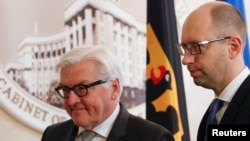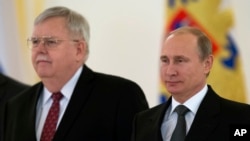Ukraine rejected Russia's suggestion to talk directly to separatists to end the conflict in the east, telling Moscow to stop “playing games” aimed at legitimizing “terrorists.”
Ukrainian Prime Minister Arseny Yatseniuk accused Moscow on Wednesday of trying to push Ukraine into recognizing the pro-Russian rebels who are fighting government troops to split parts of the eastern Donetsk and Luhansk regions from Kyiv.
Kyiv and the West have accused Russia of destabilizing Ukraine by providing the rebels with money, arms and reinforcements.
The West has imposed tough sanctions against Moscow over the conflict, which has killed more than 4,000 people and injured nearly 10,000 since mid-April.
Russia backs the separatists but denies it is directly involved in the conflict in the Donbass region. Moscow has repeatedly described Russian troops seen fighting alongside rebels as volunteers.
Russian Foreign Minister Sergei Lavrov, speaking to the lower house of parliament in Moscow on Wednesday, called for the establishment of stable contacts between Kyiv and Donbass representatives with the goal of reaching "mutually acceptable agreements."
Lavrov accused what he called "the party of war" in Kyiv of trying to exclude the separatists from the negotiating process and to force the West to make Russia a party to the conflict — moves he called "absolutely counterproductive and provocative" and doomed to fail.
'Mercenaries'
Yatseniuk declared Kyiv would not speak directly to the separatists and repeated the phrase slowly in Russian for emphasis, saying: “We will not hold direct talks with your mercenaries.” He also accused the Russian government of "making hostages" out of the population of eastern Ukraine's Donetsk and Luhansk regions, and of "leading the situation toward a humanitarian catastrophe."
Yatseniuk then called on Russia to abide by the ceasefire agreement reached between representatives of Ukraine's government and the separatists in early September. A ceasefire was agreed on Sept. 5 in Minsk, the capital of Belarus, as part of a wider deal between Moscow, Kyiv and the rebels under the auspices of the Organization for Security and Cooperation in Europe (OSCE). A former president represented Kyiv at the talks to avoid formal recognition of the rebels.
But violence continues, putting the truce under constant pressure. The deaths of government troops and civilians are reported daily.
Late Tuesday, German Foreign Minister Frank-Walter Steinmeier discussed Ukraine with Russia's President Vladimir Putin in Moscow after a last-minute invitation from the Russian leader. The two talked for 75 minutes.
Steinmeier said in Berlin on Wednesday that the two sides in Ukraine were "unfortunately still a long way from a sustainable de-escalation of the conflict and even further from a political solution." His comments echoed those he made after meeting with Lavrov in Moscow on Tuesday, when he said there was "no reason for optimism in the current situation" in eastern Ukraine.
US, Russia relations
Meanwhile, Putin said Wednesday that his country wants a relationship with the United States based on "respect," a day after he accused the U.S. of seeking to "subdue" Russia.
Speaking at a Kremlin ceremony during which a group of new ambassadors to Russia presented their credentials, Putin said Russia is ready for "practical cooperation" with the United States based on respect for each other’s interests, equal rights and non-interference in internal affairs.
He said the two countries have "special responsibility" for upholding international security and stability and countering global challenges and threats.
The new U.S. ambassador to Russia, John Tefft, was among diplomats who presented credentials to the Russian leader. The two briefly stood side by side, posing for photographers, but said little to each other at the ceremony.
On Tuesday, Putin told a meeting of supporters in Moscow that the United States is trying to bring Russia under its control and solve its problems "at our expense."
In an interview with Germany's Bild newspaper published Monday, Ukraine's President Petro Poroshenko said his country is prepared for the possibility of "total war" with Russia.
NATO says Russia has launched a "serious" military buildup both inside Ukraine and along the shared border.
According to figures from the United Nations, the conflict in eastern Ukraine has claimed more than 4,100 lives and left nearly 10,000 wounded.
Some material for this report came from AP, Reuters and VOA's Russian Service.






